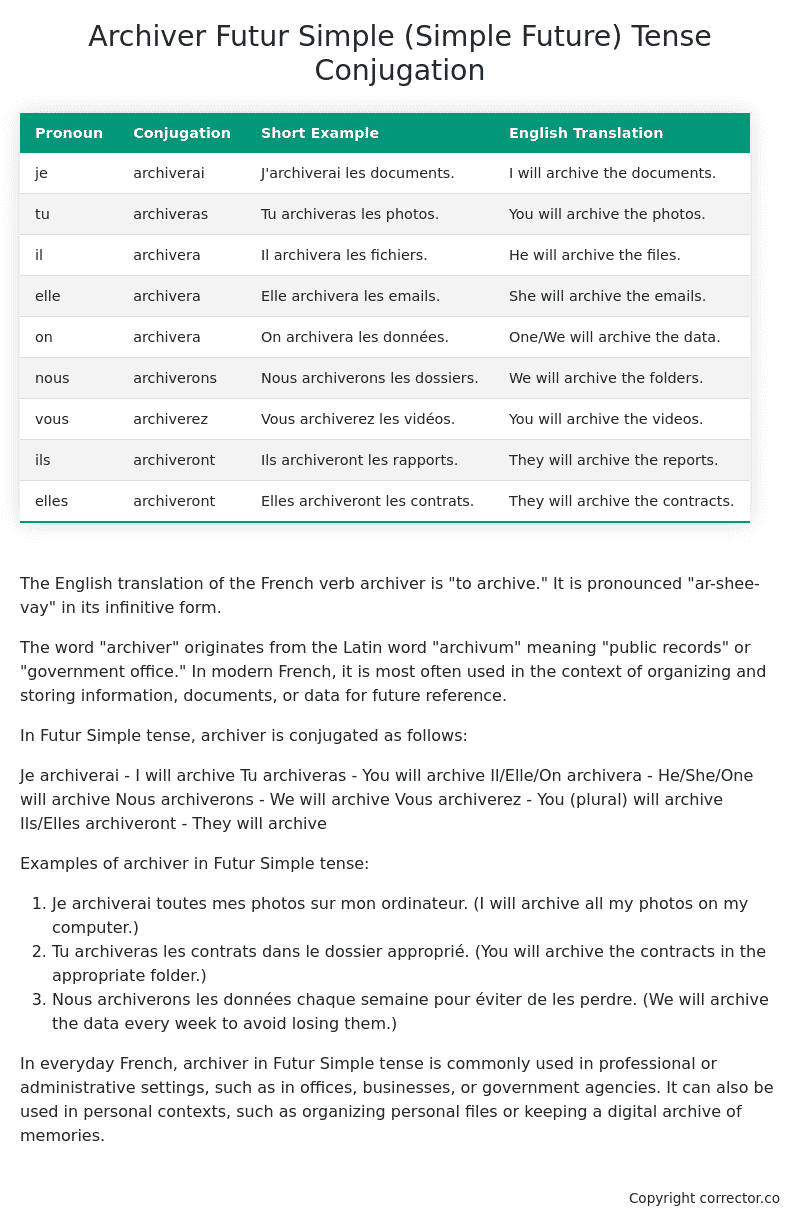Futur Simple (Simple Future) Tense Conjugation of the French Verb archiver
Introduction to the verb archiver
The English translation of the French verb archiver is “to archive.” It is pronounced “ar-shee-vay” in its infinitive form.
The word “archiver” originates from the Latin word “archivum” meaning “public records” or “government office.” In modern French, it is most often used in the context of organizing and storing information, documents, or data for future reference.
In Futur Simple tense, archiver is conjugated as follows:
Je archiverai – I will archive
Tu archiveras – You will archive
Il/Elle/On archivera – He/She/One will archive
Nous archiverons – We will archive
Vous archiverez – You (plural) will archive
Ils/Elles archiveront – They will archive
Examples of archiver in Futur Simple tense:
- Je archiverai toutes mes photos sur mon ordinateur. (I will archive all my photos on my computer.)
- Tu archiveras les contrats dans le dossier approprié. (You will archive the contracts in the appropriate folder.)
- Nous archiverons les données chaque semaine pour éviter de les perdre. (We will archive the data every week to avoid losing them.)
In everyday French, archiver in Futur Simple tense is commonly used in professional or administrative settings, such as in offices, businesses, or government agencies. It can also be used in personal contexts, such as organizing personal files or keeping a digital archive of memories.
Table of the Futur Simple (Simple Future) Tense Conjugation of archiver
| Pronoun | Conjugation | Short Example | English Translation |
|---|---|---|---|
| je | archiverai | J’archiverai les documents. | I will archive the documents. |
| tu | archiveras | Tu archiveras les photos. | You will archive the photos. |
| il | archivera | Il archivera les fichiers. | He will archive the files. |
| elle | archivera | Elle archivera les emails. | She will archive the emails. |
| on | archivera | On archivera les données. | One/We will archive the data. |
| nous | archiverons | Nous archiverons les dossiers. | We will archive the folders. |
| vous | archiverez | Vous archiverez les vidéos. | You will archive the videos. |
| ils | archiveront | Ils archiveront les rapports. | They will archive the reports. |
| elles | archiveront | Elles archiveront les contrats. | They will archive the contracts. |
Other Conjugations for Archiver.
Le Present (Present Tense) Conjugation of the French Verb archiver
Imparfait (Imperfect) Tense Conjugation of the French Verb archiver
Passé Simple (Simple Past) Tense Conjugation of the French Verb archiver
Passé Composé (Present Perfect) Tense Conjugation of the French Verb archiver
Futur Simple (Simple Future) Tense Conjugation of the French Verb archiver (this article)
Futur Proche (Near Future) Tense Conjugation of the French Verb archiver
Plus-que-parfait (Pluperfect) Tense Conjugation of the French Verb archiver
Passé Antérieur (Past Anterior) Tense Conjugation of the French Verb archiver
Futur Antérieur (Future Anterior) Tense Conjugation of the French Verb archiver
Subjonctif Présent (Subjunctive Present) Tense Conjugation of the French Verb archiver
Subjonctif Passé (Subjunctive Past) Tense Conjugation of the French Verb archiver
Subjonctif Imparfait (Subjunctive Imperfect) Tense Conjugation of the French Verb archiver
Subjonctif Plus-que-parfait (Subjunctive Pluperfect) Tense Conjugation of the French Verb archiver
Conditionnel Présent (Conditional Present) Tense Conjugation of the French Verb archiver
Conditionnel Passé (Conditional Past) Tense Conjugation of the French Verb archiver
L’impératif Présent (Imperative Present) Tense Conjugation of the French Verb archiver
L’infinitif Présent (Infinitive Present) Tense Conjugation of the French Verb archiver
Struggling with French verbs or the language in general? Why not use our free French Grammar Checker – no registration required!
Get a FREE Download Study Sheet of this Conjugation 🔥
Simply right click the image below, click “save image” and get your free reference for the archiver Futur Simple tense conjugation!

Archiver – About the French Futur Simple (Simple Future) Tense
Formation of Futur Simple
For regular -er verbs (e.g., parler – to speak)
For regular -ir verbs (e.g., finir – to finish)
For regular -re verbs (e.g., vendre – to sell)
Common Everyday Usage Patterns
Conditional Statements
Interactions with Other Tenses
Futur Antérieur
Conditional
Present
Summary
I hope you enjoyed this article on the verb archiver. Still in a learning mood? Check out another TOTALLY random French verb conjugation!


